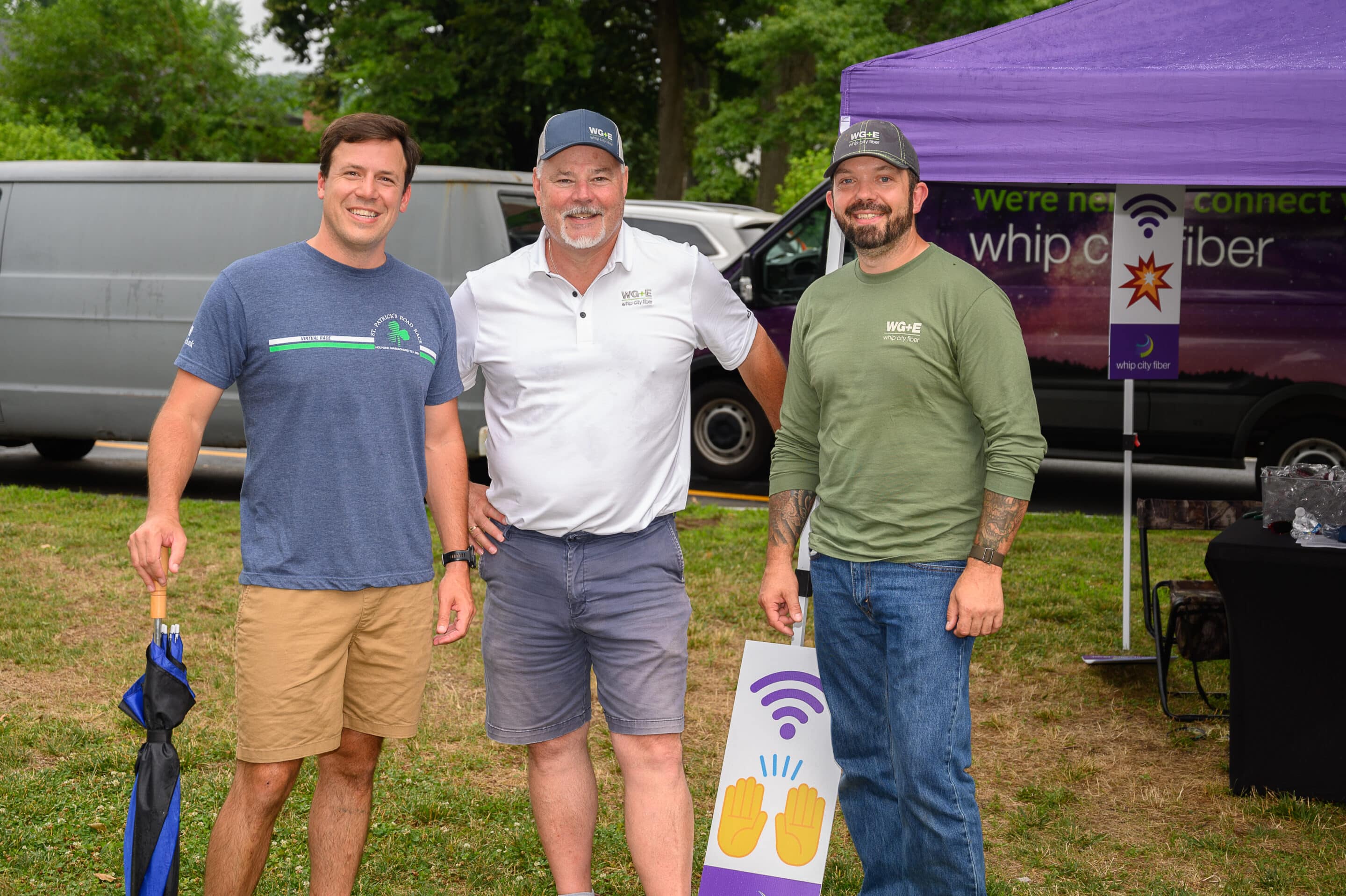West Springfield Mayor William Reichelt chats with Westfield Gas & Electric Sales Manager Brian Sullivan and fiber technician Steven Williams at the town’s 250th anniversary block party on June 22.
Reminder Publishing photo by Marc St. Onge
WEST SPRINGFIELD — Despite the billboard, the mailers and the warnings of “false promises” and “blank checks,” town councilors on June 17 voted unanimously to borrow $11 million to continue building a municipal fiber-optic network.
After a public hearing where the only resident with a strong opinion was enthusiastically in support, and nobody spoke up to represent the out-of-town political advocacy group that has been campaigning against the broadband project, councilors voiced confidence in Whip City Fiber and in the project’s prospects of turning a profit when subscribers are able to sign up.
“If you look at what’s available for internet out there … what Whip City Fiber offers is really head and shoulders above anything. It beats the competition,” said Councilor Fred Connor. “In two years, this thing is going to pay for itself if we meet these subscription targets.”
Connor acknowledged that people have concerns about what happens if the project doesn’t attract enough subscribers. He also questioned why the town should proceed with funding a wider buildout before seeing the results from the first round of connections.
The new funding, called “phase 2,” follows a $2.5 million commitment by the council in 2021 to build a pilot network along some streets in the Mittineague and Tatham areas. That network — encompassing four “fiber service areas” out of the 59 total that would cover the whole town — was supposed to be operating by now. Stephanie Straitiff, the town’s chief technology officer, said the companies that own the utility poles, Eversource and Verizon, have been slow to give Westfield Gas & Electric, the municipally owned utility that owns Whip City Fiber, access to string its lines.
Mayor William Reichelt said based on the results of a 2022 ballot question where town voters supported the project 6,355 to 1,821, he asked to push ahead with phase 2 before seeing the results of the pilot phase. The council vote means full buildout is back on track to be completed in five years.
The “fiber hut” at Mittineague Park — one of three that will serve as hubs for the network — is expected to be built by the end of July, and customers in the pilot area will be able to connect this fall, said Thomas Flaherty, general manager of Westfield Gas & Electric.
The plan is for ratepayers’ monthly fees to pay off the interest on the bonds, at no cost to the property tax levy.
Speaking at the public hearing, resident Joseph Guvendiren said he can’t wait for Whip City Fiber to come to his neighborhood. He said he believes the campaign opposing Whip City Fiber is funded by for-profit network operators such as Comcast, which currently offers the only cable television service and only broadband internet service in West Springfield.
Guvendiren said he pays $110 per month for his Comcast internet service, while Whip City Fiber is promising faster speeds at just $75 per month. That’s $45 per month, or $540 per year, that every internet-connected household in town is overpaying, he said. He said he suspects that Comcast is funding the campaign to avoid being undercut by a publicly owned competitor.
“The mailer says, ‘Paid for by MassPriorities.com.’ It might as well say, ‘Choke on it, peasant.’ We don’t know where that money comes from,” said Guvendiren. “Who does benefit from opposition to this project? The obvious answer is our friendly neighborhood monopoly.”
Reminder Publishing had reached out to Christopher Thrasher, MassPriorities’ director of policy based in the southeastern Massachusetts town of Westport, several weeks ago when the campaign started. He said the organization is not required to disclose its funding sources.
At the June 17 meeting, Reichelt referred to “this faceless entity out there that’s pumping money into a scare campaign.”
Councilor Brian Griffin called the MassPriorities campaign “unconscionable.” He sharply criticized the group for sowing distrust in the project through advertisements but not engaging in dialogue with elected officials or at the public meetings where broadband network funding has been discussed.
“This council … they know their stuff,” Griffin said. “They know when baloney’s being thrown at them. And so does the community.”
MassPriorities states on its website that it is a branch of a Minnesota-based group called the Domestic Policy Caucus. The Domestic Policy Caucus lists several political causes on its website, including opposition to government-owned broadband networks, opposition to fossil fuel bans, support for a national popular vote in presidential elections, reform of prescription drug pricing and raising the cap on interest for short-term loans.
West Springfield residents — even those outside the pilot neighborhoods — can express their interest in Whip City Fiber service by signing up at whipcityfiber.com/west-side. Connor said there are just over 260 prospective customers signed up now, but that number is expected to increase to nearly 800 by the end of the year, after service begins in the pilot area.
Whip City Fiber is advertising $74.95 per month for 1 gigabit internet service, with optional $19.95 per month telephone service. No commitment is necessary to get on the mailing list.
Flaherty said the utility has offered broadband service in Westfield for 10 years and hasn’t raised rates yet.


